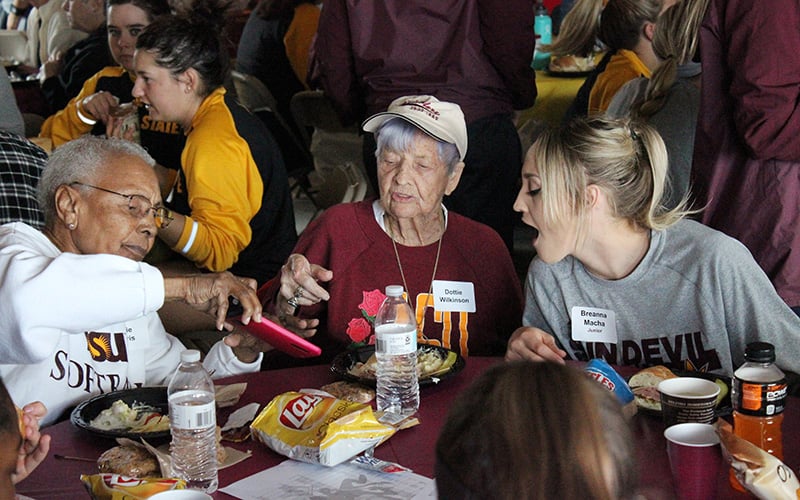- Slug: Sports-Softball Legends,850
- Photo available (thumbnail, caption below)
By SHELBY HYDE
Cronkite News
TEMPE — They played at a city park. They slept in gymnasiums. Sometimes they ate only bologna sandwiches. And they had to wear basketball uniforms to play their softball games. It might not sound like a formula for winning national championships, but it worked for Arizona State’s softball program when the Sun Devils won back-to-back titles in 1972-73.
Members of some of those early teams and other players who are in the Arizona Softball Hall of Fame met recently with current ASU players to help them better appreciate the groundwork that was laid for them in the years before Title IX.
Title IX legislation passed in the summer of 1972 and prohibits discrimination based on gender in federally funded programs. The legislation never mentioned sports, but Title IX turned out to be revolutionary for women’s sports in high schools and colleges.
Joanna Burton, who coached softball for 37 years and is a member of the Arizona Softball Foundation’s board of directors, said former players and coaches have talked for years about meeting with current players.
They want to ensure that today’s players understand what those who preceded them went through to grow the sport.
“These women have all played before Title IX,” Burton said of the former softball players. “So none of these women had the things that these girls have, but they blazed the path for these ladies.”
ASU senior catcher Sashel Palacios appreciated the input. She said she came to ASU, in part, because of the program’s tradition of excellence.
“It’s always really special to have former players because they helped pave the way for this program,” Palacios said. “It’s really awesome to hear about their stories when they were playing here and how much the game and everything has developed. It’s a really humbling experience.”
ASU coach Trisha Ford said the Valley was a “hotbed of softball” when the legends who met with her team were playing. When the Sun Devils think they’re going through a tough time, she said, they can benefit from the stories.
“There are days where we think we have it rough,” Ford said. “Hearing their stories and how much the love of the game is still inside of them . . . these are 80-year-old women and when they talk about softball, their whole bodies light up. So it was really neat for our players to be around.”
Several women from ASU’s 1972 and 1973 championship teams were in attendance. Burton said that when those teams went to the nationals, the players slept on the floor of a gym and ate bologna sandwiches.
Lee Ann Easley, who played for those teams, marveled at how far the sport has come at ASU. The Sun Devils now have their own facility, the Alberta B. Farrington Softball Stadium on ASU’s Tempe campus.
During her playing days, Easley said the team didn’t have a field, so they played at a city park. The uniforms weren’t exactly state of the art, either.
“When we played, we used basketball uniforms and put a shirt underneath them,” Easley said. “We didn’t have individual uniforms.”
Burton said those early softball squads were essentially club teams because there were no scholarships for collegiate women in sports.
“They are far better players than we were, and I think that’s because softball has come a long way (with) better coaching, better facilities, better camps that they can go to,” Burton said, “I’ll bet you most of these girls started playing at age 8 and 9 years to be this good.”
The game has evolved, too. Burton described a rough-and-tumble style in her days on the diamond, when players could slide and block bases.
More than anything, the former players emphasized that bonds formed with their teammates when they played the game endure today. They told today’s players to cherish those friendships most of all.
“I would just like for them to enjoy their friends, enjoy your teammates because they’ll be with you forever,” said 95-year-old Dottie Wilkinson, a member of the National Softball Hall of Fame. “You don’t think they are now, but they are.”
Billie Harris, a former pitcher who was inducted into the Arizona Softball Hall of Fame, still calls Wilkinson every morning at 8:30 just to check in on her.
That was a story that left an impression on ASU’s junior pitcher Breanna Macha.
“She (Wilkinson) said she made those lifelong friendships, and that made me tear up,” Macha said. “It really hit home with me.”
Palacios said players should hold onto the friendships they make during their playing days because they will last forever.
“It’s really refreshing to see how close they still are,” she said. “It’s my last season so it’s kind of bittersweet, but I think they really helped pave the way for this sport, and just to not let these opportunities go.”
Macha believes there is at least one way that today’s players can honor the pioneers of the game.
“Just go out there and play hard because that’s what they always did,” Macha said. “That’s the legacy that they tried to pass down to us.”
^__=
Billie Harris, Dottie Wilkinson and ASU pitcher Breanna Macha, from left, look at old photos during the ASU softball team’s lunch with former players. Harris is the first African-American woman inducted into the Amateur Softball Association of America Hall of Fame, while Wilkinson is in both the National Softball Hall of Fame and the Women’s International Bowling Congress Hall of Fame. (Photo by Tyler Drake/ Cronkite News)
